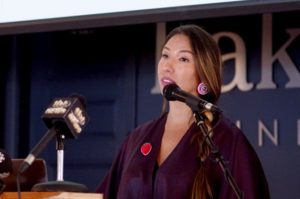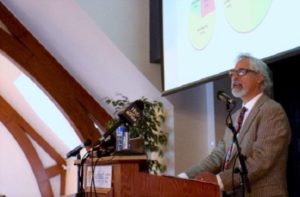Progress underscored at delivery of the Report Card on the Implementation of the Recommendations from First Nations Youth Inquest

By Rick Garrick
THUNDER BAY — The Year Three Report Card on the Implementation of the Recommendations from the First Nations Youth Inquest in Thunder Bay featured an overall grade of A-, up from B+ in Year Two and C+ in Year One.
Northern Nishnawbe Education Council and Dennis Franklin Cromarty High School and Keewaytinook Okimakanak received A+s while the City of Thunder Bay received an A. Nishnawbe Aski Nation and Matawa Learning Centre received A-s and Canada and Ontario received B+s.
“It’s not so much about the score, it’s to underscore that work is still continuing and this isn’t the end stop, but we’re continuing to make progress and continuing working hard with our partners,” says Regina Mandamin, manager of Indigenous Relations and Inclusion with the City of Thunder Bay and a Wiikwemkoong citizen. “Overall, it is a good reminder that work is continuing to be done and we are continuing to be accountable not just to the public but also to the families of the youth.”
The Report Card was delivered on Aug. 21 at Lakehead University’s Bora Laskin Faculty of Law by Jonathan Rudin and Caitlyn Kasper, lawyers with Aboriginal Legal Services and counsel for the families of six of the seven youth who were the subject of the First Nations Youth Inquest, on the progress made in Year Three in meeting the inquest jury’s 145 recommendations. The inquest was held over nine months from October 2015 to June 2016.
“For many of the families, they waited for this inquiry for years before it actually took place,” Kasper says. “One hundred and forty-five recommendations is an overwhelming amount, so I think there was initially some hesitation and concern from the families as to whether or not those recommendations were going to be taken seriously. I think, as we’ve shown over the years, this has been a real progression in terms of the parties making real substantive efforts to complete what was brought before them.”
The Year Three Report Card indicates that four per cent of the 17 long-term recommendations were complete and 92 per cent in progress. The 40 medium-term recommendations were 56.9 per cent complete and 41 per cent in progress while the 88 short-term recommendations were 78 per cent complete and 14 per cent in progress. The grades were based on reports filed by the parties with the Office of Chief Coroner.

“It is very gratifying to see that the parties to the inquest have clearly taken the recommendations of the jury to heart and are making a real effort to change the way educational and other services are provided to First Nations Youth from remote communities,” Rudin says. “It should not have taken the deaths of seven young people in order to see this type of progress but we know that the hard work that took place over the many months of the inquest were not in vain.”
Fort William First Nation Elder Marlene Pierre, who provided the opening and closing ceremonies for the Report Card announcement, applauded the lawyers for their work on the Report Card.
“It is no use to have that kind of information unless we do something with it,” Pierre says. “It takes a lot of courage and a lot of imagination and a lot of attention to figuring out what is the best path to take with some of these issues.”
The Year Three Report Card and the material used to compile the grades are posted online. The Thunder Bay Police Service did not receive a grade, as was the case with the Year Two Report Card.

